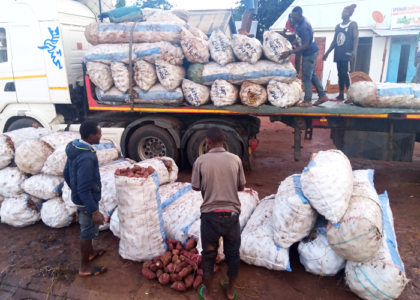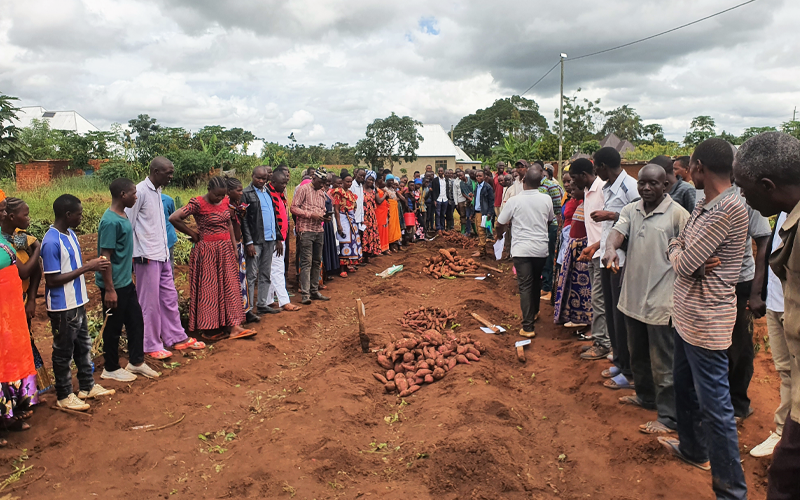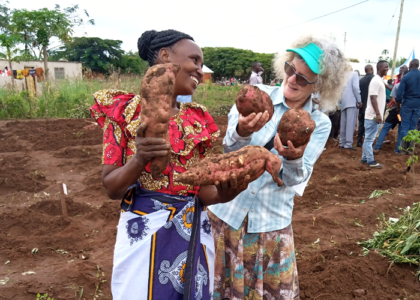In any field, change needs leaders – even in agriculture.
Mary Samson may appear like an ordinary farmer, toiling in her fields to grow sweetpotato, among other crops, for her family’s dinner table and the market place. But she is anything but ordinary. Samson is an agent of change, helping farmers in Bukombe district, Tanzania, to improve their sweetpotato yields with certified healthy seed.
The SweetGAINS project, supported by the International Potato Center (CIP) in collaboration with the Tanzanian Agriculture Research Institute (TARI), seeks to improve the lives of all Africans by developing systems to improve sweetpotato varieties and production and build value chains that ensure this nutritious crop reaches vulnerable families.
Samson was trained in the SweetGAINS program to be a certified commercial sweetpotato seed producer. She offers her fields as a demonstration site for other farmers in her village of Namonge to see the end results of growing sweetpotato with healthy planting materials that she produces on her farm.

Bukombe district is well-suited to sweetpotato production and while many farmers grow this crop already, yields are well below global averages per hectare, largely due to low quality seed used in the fields. From February to April, the market hub of Runzewe bustles with young men loading bags of sweetpotato onto trucks destined for Dar es Salaam and other major cities in Tanzania. Some of this produce is traded with other countries as far away as the Comoros Islands.
To unleash this untapped potential, SweetGAINS has been promoting the use of high-quality sweetpotato planting material among farmers in Tanzania to ensure better harvests and a lowered risk of pests and disease. TARI and CIP also collaborate to identify market-preferred varieties by talking with traders, consumers and farmers to discover the most desired traits in sweetpotato. Then they share that information with breeders to help develop those varieties.
Farmers like Samson provide an invaluable service by hosting demonstration plots where scientists and local farmers can observe the results of various planting materials and new sweetpotato varieties. Recently, TARI and CIP hosted a farmer field day that attracted over 110 people to witness and sensory-test the harvest of six varieties: Ukimwi, Pisitatu, Ukerewe, Kabode, Polista and UKG05.
The information from the sensory-testing is evaluated to see which traits impress farmers and consumers in term of appearance, taste and cookability. At this field day, Ukimwi and Pisitatu emerged as the preferred varieties, primarily for their thick skin, which helps minimize bruising during transportation to distant markets.

The farmer field day also marks the end of a training in seed production. Participating farmers (including Samson) received certificates from the Tanzania Official Seed Certification Institute (TOSCI), which recognizes their official status as certified seed producers.

For this work, CIP and TOSCI trained seed producers on standards and regulations for production of certified seed and helped them to establish an association of seed producers from across the Lake Zone to improve their collective communication, marketing, training, and fundraising. The association also acts as a bridge between certified seed producers and other sweetpotato value chain actors (e.g., transporters, sellers).
The SweetGAINS project provided Samson with a mini-screenhouse in which she multiplies the high-quality seed received from TARI before she takes that seed to the field for multiplication. She then sells that seed to neighboring farmers. With the additional income, Samson is constructing a four-room house for her family. Many other farmers are using the added revenue to support their children’s education and to secure other livelihood improvements for family well-being.
Authors: Norman Kwikiriza, Kwame Ogero and Saadan Edson
Note: SweetGAINS is made possible through the generous support of the Bill and Melinda Gates Foundation
